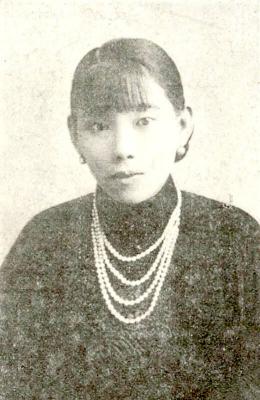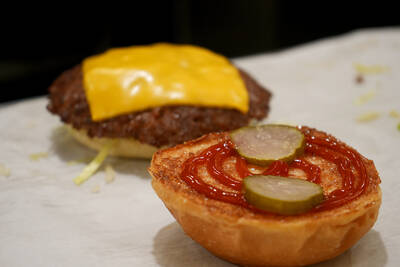With a celebrity owner (singer and TV host Pauline Lan, 藍心湄) and a prime location in Taipei’s East District (東區), Kiki Restaurant is one of the best-known spots for Sichuan cooking in Taipei. Reservations are a must: On a Friday visit, one of our six-member party was reduced to sitting on a stool when the restaurant ran out of chairs even though we had called ahead for a table. The waiting time last Sunday night for walk-ins was an hour.
The long lines, slightly snooty service (we were curtly informed on the phone that reservations are held for only 10 minutes) and less-than-comfy seating (chairs are made of the same hard plastic as the stools) are made up for by the sheer deliciousness of the food. Kiki rates the spiciness of its dishes from one to four stars, with the latter being for diners with iron tongues. On our first visit, we seared our taste buds with the Sichuan-style spicy braised bean curd (麻婆豆腐, NT$200) and stir-fried minced pork with Chinese chives and fermented black beans (蒼蠅頭, NT$220) — and those two dishes rated only three stars. Slightly gentler courses include the very good four seasons beans with minced pork and Chinese spices (干扁四季豆, NT$210) and “the pan fried eggs until they are golden brown and then stir-fried with ground chili peppers” (回鍋蛋, NT$180). The menu’s detailed description of the latter dish doesn’t capture its sheer awesomeness. Hard-boiled eggs are sliced and then stir-fried with a variety of tasty spices and minced chili peppers. The resulting combination of flavors and textures — the sharp and savory spices against the firm egg white and soft yolk — will make your tongue happy, even if it is still recovering from the mapo tofu. The Sichuan-style stir-fried chicken with chili peppers (宮保雞丁, NT$280) was also very good, if a tad salty, with large chunks of meat mixed with peanuts and slices of chili peppers.
On a second visit, my companion and I ordered braised oysters with fermented black beans (豆豉青蚵, NT$290). The fermented beans added just the right amount of kick and contrast to the plump and juicy shellfish. Throwing caution to the wind, we taunted our arteries with salted grilled pork slices (鹽豬肉, NT$270), which probably consisted of the fattest cuts the butcher could find on the pig. As a counterpoint to the strong flavors of the braised oysters and pork, we selected the very mild braised silk melon with clams (絲瓜炒蛤蜊, NT$270). Each slice of melon was indeed silky and smooth and the clams were fat, but a little tough. Salty dried shrimp kept the dish from becoming bland.
Tables for two are available, but you’ll get the most out of Kiki if you go in a larger group. For one thing, the portions are somewhat skimpy, and expensive. Drinks include Kiki’s special plum juice (鳥梅汁, NT$140 per carton or NT$45 per glass), which is supposed to help soothe chili-addled mouths. Red and white wines are available by the bottle (NT$1,000); the former is pleasantly dry but not particularly memorable. A small selection of cocktails, Taiwan beer, and teas are also available; the most incongruous option on the beverage menu is probably
the iced Oreo smoothie (Oreo
冰沙, NT$200).
Go to www.kiki1991.com for information on other Kiki franchises.

Many people noticed the flood of pro-China propaganda across a number of venues in recent weeks that looks like a coordinated assault on US Taiwan policy. It does look like an effort intended to influence the US before the meeting between US President Donald Trump and Chinese dictator Xi Jinping (習近平) over the weekend. Jennifer Kavanagh’s piece in the New York Times in September appears to be the opening strike of the current campaign. She followed up last week in the Lowy Interpreter, blaming the US for causing the PRC to escalate in the Philippines and Taiwan, saying that as

Nov. 3 to Nov. 9 In 1925, 18-year-old Huang Chin-chuan (黃金川) penned the following words: “When will the day of women’s equal rights arrive, so that my talents won’t drift away in the eastern stream?” These were the closing lines to her poem “Female Student” (女學生), which expressed her unwillingness to be confined to traditional female roles and her desire to study and explore the world. Born to a wealthy family on Nov. 5, 1907, Huang was able to study in Japan — a rare privilege for women in her time — and even made a name for herself in the

This year’s Miss Universe in Thailand has been marred by ugly drama, with allegations of an insult to a beauty queen’s intellect, a walkout by pageant contestants and a tearful tantrum by the host. More than 120 women from across the world have gathered in Thailand, vying to be crowned Miss Universe in a contest considered one of the “big four” of global beauty pageants. But the runup has been dominated by the off-stage antics of the coiffed contestants and their Thai hosts, escalating into a feminist firestorm drawing the attention of Mexico’s president. On Tuesday, Mexican delegate Fatima Bosch staged a

Taiwan can often feel woefully behind on global trends, from fashion to food, and influences can sometimes feel like the last on the metaphorical bandwagon. In the West, suddenly every burger is being smashed and honey has become “hot” and we’re all drinking orange wine. But it took a good while for a smash burger in Taipei to come across my radar. For the uninitiated, a smash burger is, well, a normal burger patty but smashed flat. Originally, I didn’t understand. Surely the best part of a burger is the thick patty with all the juiciness of the beef, the